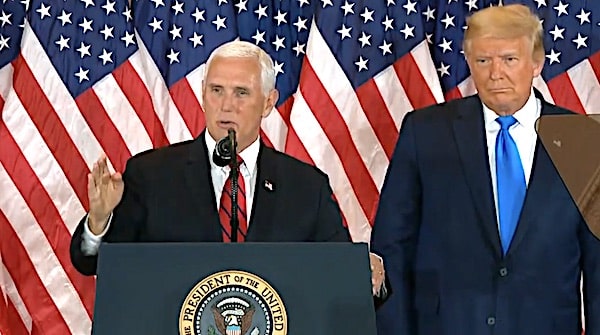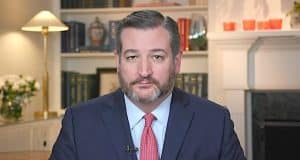Vice President Mike Pence and President Donald J. Trump on Election Night 2020 (Video screenshot)
An analysis of the American Constitution and its subsequent election laws by two prominent law professors suggests that if there are Electoral College votes still in dispute when they are counted in Congress, the vice president, as presiding officer of the joint session, could simply choose which to count.
Or not.
The scenario isn’t that remote, as there are multiple states where the results from the Nov. 3 balloting still are being challenged in the courts. Some of the cases appear to be heading to the Supreme Court, which, of course, could issue rulings that would resolve those uncertainties.
TRENDING: ‘Tsunami’ of vote-fraud evidence rolled out in Pennsylvania, Arizona, Georgia, Michigan
But the explanation posted by the American Mind, and written by John Yoo, a law professor at California-Berkeley, and Robert J. Delahunty, a law professor at St. Thomas University, reveals the constitutional provision can be interpreted to say that Vice President Mike Pence, as the presiding officer at the joint session of Congress when Electors are counted, can refuse to “count” some, if they remain disputed.
The conclusions come in an article posted only days before the election. They had mentioned the “closely and bitterly divided electorate; the threat of violence and disruption on Election Day or after; and the unusual circumstances of the Covid-19 pandemic.”
What did happen is that the electorate gave President Trump huge margins in several swing states, but “dumps” of massive numbers of ballots after the polls closed eventually pushed Joe Biden into the lead.
Multiple court cases have been filed based on a wide range of suspicions, often supported by witnesses and documentation, that Biden was given extraordinarily high percentages of those late votes, and more.
Should Mike Pence use this strategy to keep Trump in office?
100% (59 Votes)
0% (0 Votes)
Specifically, in several states, officials are under attack for changes they made to election procedures that apparently directly violated their own state election laws and the state constitution, regarding elections.
Any of those states’ Electors could be still under challenge in January when Congress “counts” those votes.
The professors found that the “constitutional structure” favors President Trump if Election Day “fails to result in a clear winner.”
The professors cite the “unprecedented” circumstance of the COVID-19 pandemic influencing the election procedures, and ultimately, they correctly suggested “Trump appears to be the winner on the morning after Election Day, but a ‘blue wave’ begins in the days and weeks after, and Biden claims a belated, overtime victory.”
Those “delayed” results actually could pose problems, they warned.
“An old federal statute, the Electoral Count Act of 1887, establishes deadlines for the states to report their official results and for the 538 members of the Electoral College to meet. The latter date this year is December 14, or 41 days after Election Day. The state deadline this year is December 8. The date is a safe harbor: if a state reports in time, Congress will accept its electors. The Act provides that if ‘any controversy or contest’ remains after December 8, Congress will decide which electors—if any—may cast their state’s votes in the Electoral College,” they explained.
They also mentioned the constitutional provision that gives to state legislators the power to appoint Electors.
“The constitutional question is not whether but how a state legislature could reclaim the appointment of electors. States have provided by statute for the selection of their electors by their voters; therefore it one might argue they may only resume that power with a second, superseding statute. On the other hand, the Constitution specifically designates state legislatures, rather than the executives or a combination of the two, to choose the electors. A state legislature might argue that a past legislature-and-governor cannot constrain its discretion to choose electors today. Is it likely that state legislatures in battleground states could reclaim their constitutional power before the December 8 deadline looms? Probably not.
“While Republicans control the state legislatures in six key battleground states, only two of those states also have Republican governors (Arizona and Florida). In four other contested states Republicans control the legislature, but Democrats control the executive: Michigan, North Carolina, Pennsylvania, Wisconsin. Only if the Constitution allows state legislatures, acting without the governor, to choose the electors, could those states cast electoral votes in a disputed popular election.”
But, they explained, there’s another plausible scenario.
“This requires a closer look at the Electoral Count Act. The Act contemplates a post-election period in which states have the opportunity to resolve any ‘controversy or contest’ in accordance with their pre-election law through ‘judicial or other methods or procedures.’ Once this process has reached a definitive conclusion or ‘final ascertainment,’ the governor is then to certify the electors. But the Act presupposes that all such controversies or contests have run their course before the governor submits the certified list of electors. What if December 8 is at hand and the controversies are still going on?
“Another provision of the Act could come into play. If a State has held an election on November 3 ‘and has failed to make a choice’ by the December 8 deadline, the Act declares that ‘the electors may be appointed on a subsequent day [after Nov. 3] in such a manner as the legislature of such State may direct.’ That failure could arise from fraud, uncertainty, ongoing recounts or litigation. In those circumstances, a state could be said to have ‘failed’ to make a choice, and its legislature could pick the electors,” they explained.
But the Founders addressed the possibility that the Electoral College vote would fail to produce a winner, and it’s possible that Electoral College votes would remain “under question, whether because of fraud in the vote, inability to county ballots accurately under neutral rules, or a dispute,” even if they are certified by a governor.
“Under the 12th Amendment, ‘the President of the Senate [i.e., the Vice President] shall, in the Presence of the Senate and House of Representatives, open all the certificates [of the electoral votes of the states] and the votes shall then be counted.’ Left unclear is who is to ‘count’ the electors’ votes and how their validity is to be determined,” the wrote.
“We suggest that the Vice President’s role is not the merely ministerial one of opening the ballots and then handing them over (to whom?) to be counted. Though the 12th Amendment describes the counting in the passive voice, the language seems to envisage a single, continuous process in which the Vice President both opens and counts the votes.”
They suggest if “counting” the votes is the vice president’s responsibility, “then the inextricably intertwined responsibility for judging the validity of those votes must also be his.”
“If that reading is correct, then the Electoral Count Act is unconstitutional. Congress cannot use legislation to dictate how any individual branch of government is to perform its unique duties: Congress could not prescribe how future Senates should conduct an impeachment trial, for example. Similarly, we think the better reading is that Vice President Pence would decide between competing slates of electors chosen by state legislators and governors, or decide whether to count votes that remain in litigation.”
The result could be no winner from the Electoral College, and the election then would go to the House of Representatives, where each state would get one vote.
The professors then outlined a series of additional backups that, they suggest, could even result in a President Mike Pompeo, if certain alignments develop.
“It just might fit our bizarre times,” they wrote.
Just the News found other opinions on the matter, including Norman J. Ornstein of the American Enterprise Institute who called the idea “ludicrous on its face.”
“Attorney Richard Roth of The Roth Law Firm, a New York-based litigation firm, told Just the News in an email that while the professors’ essay ‘raises several very valid – and very controversial – issues, they all rest on one fact: the certification of election results,'” the report said.




